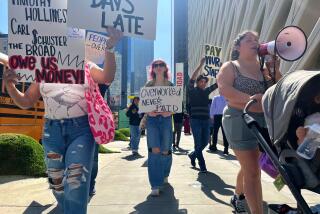Workers Camp at Closed Factory : Recession: They are maintaining a 24-hour vigil at the plant, claiming that it is their only collateral for more than a month of unpaid wages.
- Share via
It may not yet rival the script for “Norma Rae,” but the workers at Ana’s garment factory in Hollywood have laid down the line.
For the last six days, they have maintained a 24-hour vigil in front of the padlocked brick building, contending that at least 22 machine operators are owed more than a month of back wages.
The factory, they said Wednesday, is their only collateral. If the owner comes to remove the two dozen sewing machines still inside, they vow they will block the driveway with their bodies and cars to keep him from liquidating the last remaining assets.
“We’ll be here day and night, night and day,” said Maria Bonilla, 36, who contends that she and her husband are owed $1,800 in unpaid wages. “He knows he owes us, and we’re going to defend our rights.”
The owner’s son, Jack Galvardjian, said they can wait as long as they want. “Tell them, no problem. Have a picnic. Sit down and enjoy themselves. They just don’t get it.”
Galvardjian, 21, who handles business transactions for his father, Oganes, said the business simply fell victim to the recession. First, there were fewer orders from clothing companies to fill, then his father lost his house. Finally, he said, his father was forced to file for Chapter 7 bankruptcy.
“Let them go ask Bush to give them their money,” Galvardjian said. “After he took over, work just got slower and slower and slower.”
Investigators from the U.S. Department of Labor went by the factory Wednesday and handed out forms to complain about lost wages to the dozen or so workers camped out front in the 1700 block of Kenmore Avenue. But Charles Striegel, an investigation supervisor for the agency, said that if the lost wages are ever secured, it won’t be any time soon.
“It’s not a good situation,” said Striegel, adding that state labor officials also are looking into the matter. “It was a very sad thing to see.”
There were no signs, however, that the workers’ determination was flagging. The Spanish-speaking immigrants from Central America and Mexico who earn about $150 a week say bills are stacking up, rents are late and baby-sitters need to be paid.
Luz Dorival, for one, is not willing to write off $1,300 in wages. When asked how long she is prepared to keep sentry outside the factory where she has worked since 1987, the 48-year-old woman said: “Until we get what they owe us.”
The workers, who said their paychecks bounced last month, realized the bottom had fallen out when they arrived Friday morning and found that someone had removed much of the machinery, all of the business papers, the coffee maker and the phone.
Fearful that the last sewing machines would be carted away, they exchanged phone numbers and arranged a schedule for their vigil, taking turns passing nights in a car parked out front.
More to Read
Inside the business of entertainment
The Wide Shot brings you news, analysis and insights on everything from streaming wars to production — and what it all means for the future.
You may occasionally receive promotional content from the Los Angeles Times.










